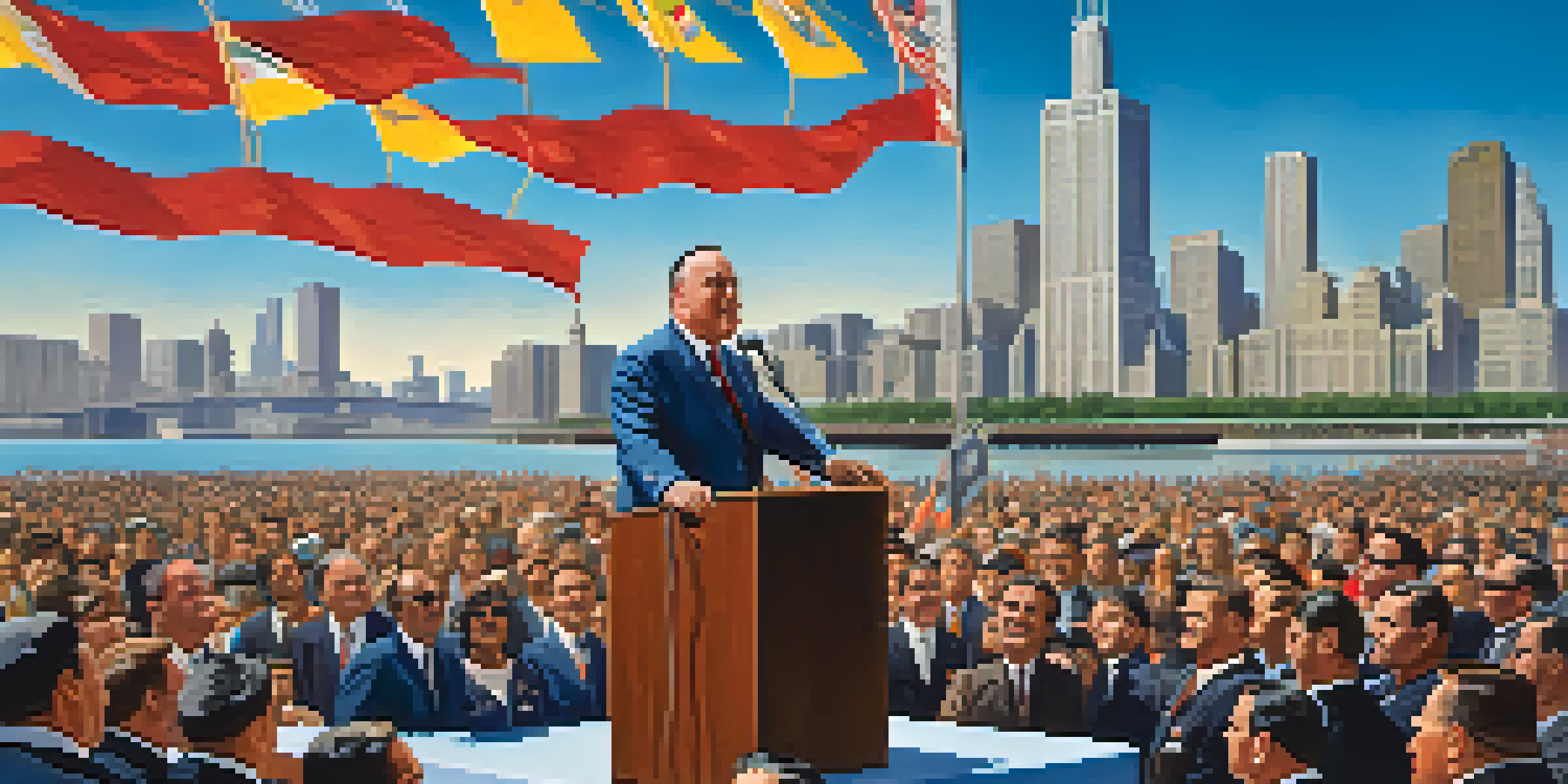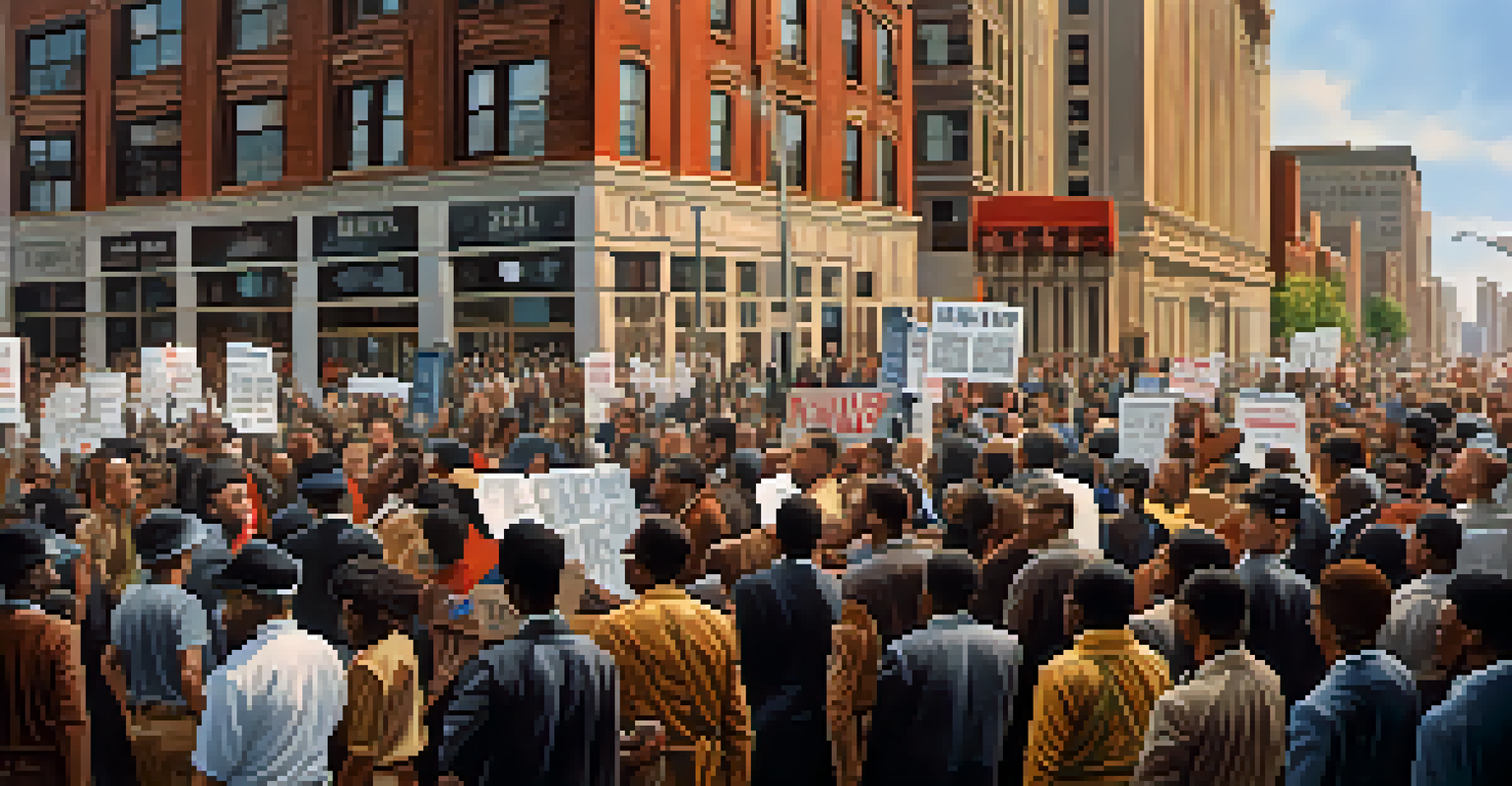The Impact of Richard J. Daley on Chicago's Political Landscape

Introduction to Richard J. Daley's Political Era
Richard J. Daley served as the Mayor of Chicago for 21 years, from 1955 to 1976, becoming one of the most influential figures in the city's history. His tenure marked a significant period that shaped not only the city's political landscape but also its social and economic fabric. Daley’s leadership style and policies left a lasting impression on Chicago, earning him both admiration and criticism.
The greatness of a man is not in how much wealth he acquires, but in his integrity and his ability to affect those around him positively.
Daley was known for his strong-arm tactics and his ability to maintain control over the Democratic Party in Chicago, gaining the nickname 'the Boss.' This control enabled him to implement a wide array of initiatives that would redefine the city. His approach was often characterized by a hands-on management style, which many believe was crucial for navigating the complex political climate of the time.
As we delve deeper into Daley's impact, it's essential to understand the context in which he operated. The mid-20th century was a time of significant change in America, with civil rights movements gaining momentum and urbanization transforming cities. Daley's administration had to navigate these turbulent waters, and his policies reflected both the challenges and opportunities of the era.
Daley's Role in the Democratic Party
Daley's influence on the Democratic Party in Chicago was profound, as he effectively orchestrated party operations and built a powerful political machine. His ability to mobilize voters and secure loyalty among party members was unparalleled, leading to a dominance that lasted for decades. This machine politics model became a blueprint for political operations in various cities across the U.S.

Under Daley's leadership, the Democratic Party grew increasingly intertwined with various social and economic interests. For instance, he worked closely with labor unions, which bolstered his support among working-class voters. This collaboration not only solidified his power but also shaped the policies that benefited labor and urban development.
Daley's Political Dominance
Richard J. Daley's strong control over the Democratic Party established a powerful political machine that influenced Chicago for decades.
However, this tight-knit relationship between Daley and the party also raised concerns about corruption and favoritism. Critics argued that the patronage system he established prioritized loyalty over merit, leading to inefficiencies and a lack of accountability. Despite these criticisms, Daley’s ability to maintain party unity and power was a testament to his political acumen.
Urban Development and Infrastructure Initiatives
One of Daley's most notable contributions to Chicago was his focus on urban development and infrastructure improvements. His administration oversaw the construction of numerous public works projects, including roads, bridges, and public housing. This initiative aimed to modernize the city and accommodate its growing population, making Chicago a more attractive place to live and work.
Politics is not a game of poker; it is a game of chess. The winner is the one who can see the whole board.
Daley's vision for a modern Chicago extended beyond just infrastructure; he also championed beautification projects and cultural institutions. For example, he played a crucial role in the creation of the modern Chicago skyline by promoting the construction of skyscrapers and civic buildings. These efforts not only transformed the city’s appearance but also contributed to its economic growth.
However, not all of Daley's urban development efforts were met with approval. Some projects, particularly those involving public housing, faced criticism for displacing communities and perpetuating segregation. This duality in his legacy highlights the complexity of urban politics and the often contentious nature of development initiatives.
Daley and Civil Rights Movements
The civil rights movement of the 1960s posed significant challenges for Daley's administration, forcing him to confront issues of racial inequality and social justice. His initial response was often seen as cautious, as he aimed to maintain order amid growing tensions between communities. This approach drew criticism from activists who felt that Daley was not doing enough to address systemic racism or promote equal rights.
Despite this, Daley eventually took steps to engage with civil rights leaders and address some of their concerns. His administration began to implement policies aimed at improving housing and employment opportunities for African Americans. However, these efforts were often seen as reactive rather than proactive, leading to ongoing frustrations among community leaders.
Urban Development Initiatives
Daley's administration focused on modernizing Chicago through extensive infrastructure and urban development projects that reshaped the city.
The 1968 Democratic National Convention in Chicago highlighted the deep divisions within the city and the nation regarding civil rights. Daley's heavy-handed response to protests during the event further damaged his reputation and led to widespread condemnation. This moment served as a turning point, exposing the limitations of his administration's approach to civil rights.
The Legacy of Richard J. Daley
Richard J. Daley's legacy is a complex tapestry of achievements and controversies that continue to influence Chicago politics today. On one hand, he is remembered for his significant contributions to the city’s infrastructure and urban development. His efforts to modernize Chicago helped to lay the groundwork for the city's future growth and prosperity.
On the other hand, Daley's political machine and his handling of civil rights issues have left a mixed legacy. Critics argue that his administration fostered an environment of corruption and cronyism, which undermined democratic principles. Additionally, the social tensions that arose during his tenure still resonate in discussions about race and equity in Chicago.
Today, as Chicago grapples with its past and seeks to build a more inclusive future, Daley's influence remains a topic of discussion. Understanding his impact helps illuminate the challenges and opportunities that lie ahead for the city, as it continues to navigate the complexities of urban governance and social change.
Daley's Impact on Future Generations of Politicians
Richard J. Daley's political strategies and governance style have left an indelible mark on future generations of Chicago politicians. His methods of coalition-building and voter mobilization are still studied and emulated by aspiring leaders. Many politicians have sought to harness the power of machine politics, inspired by Daley's success in maintaining control over the city’s political apparatus.
However, the political landscape has evolved since Daley's time, with an increased emphasis on transparency and accountability. Today's leaders face pressure to adopt more open and inclusive practices, which contrasts with the patronage system that characterized Daley's administration. This shift illustrates the changing expectations of constituents in a more diverse and interconnected city.
Civil Rights Challenges
Daley faced significant criticism for his cautious approach to civil rights issues during a time of social upheaval, highlighting the complexities of his legacy.
As we look at current political dynamics in Chicago, it's clear that Daley's legacy is both a cautionary tale and a source of inspiration. While some still admire his ability to navigate complex political waters, others advocate for a new style of governance that prioritizes equity and community engagement, reflecting the diverse needs of the city's residents.
Conclusion: The Enduring Influence of Richard J. Daley
In conclusion, Richard J. Daley's impact on Chicago's political landscape is both profound and multifaceted. His tenure as mayor not only shaped the city's physical environment but also influenced its political culture and societal dynamics. While he is often celebrated for his achievements in urban development, his legacy is complicated by issues of race, equity, and governance.
As Chicago moves forward, the lessons learned from Daley's era remain relevant. Understanding the successes and shortcomings of his administration can provide valuable insights for current and future leaders. The challenge lies in balancing the need for strong political leadership with the demand for accountability and inclusivity.

Ultimately, Richard J. Daley's legacy is a reminder of the complexities of urban governance. As Chicagoans reflect on their city's past, they continue to navigate the delicate balance between progress and tradition, ensuring that the lessons of history inform a brighter, more equitable future.